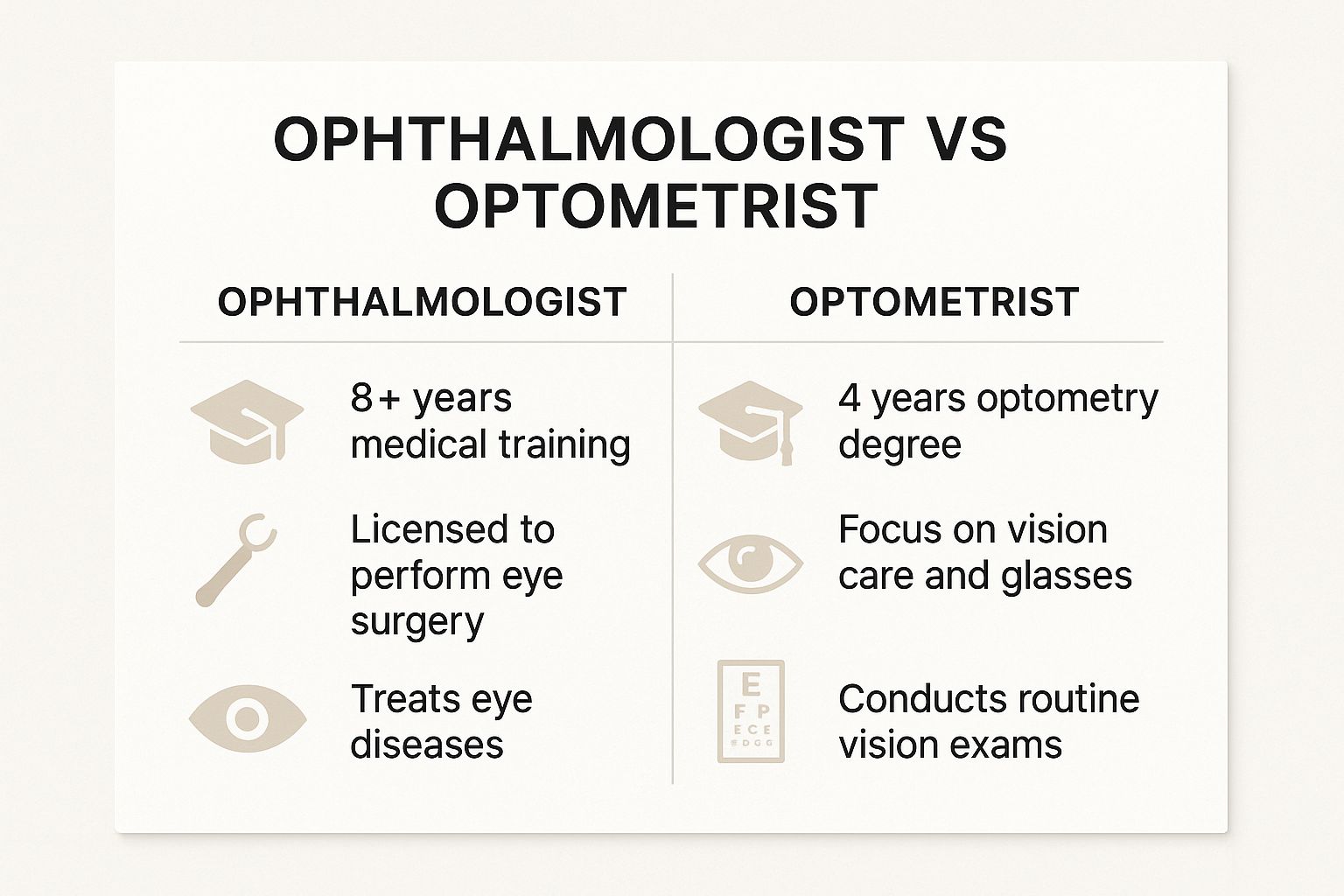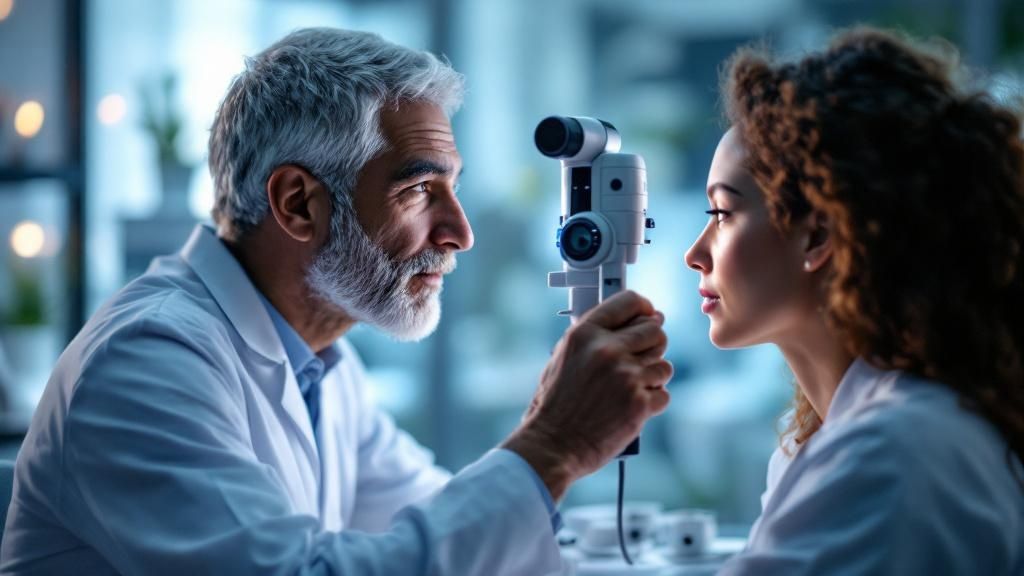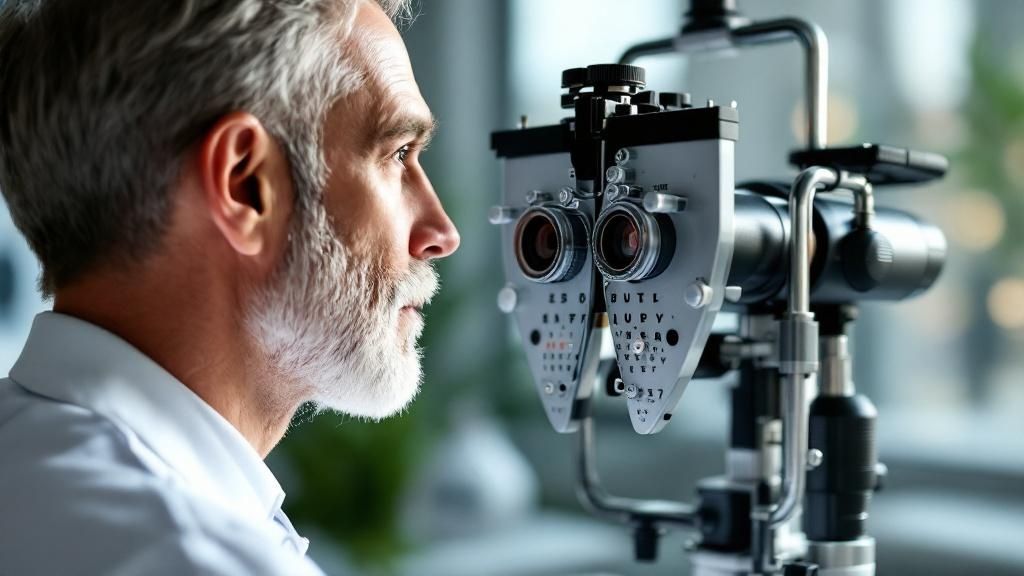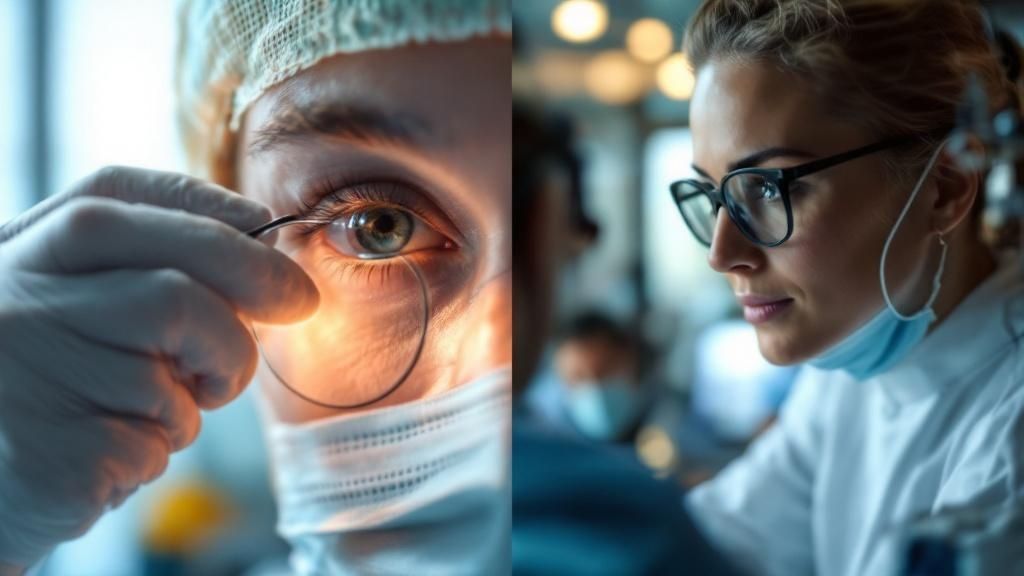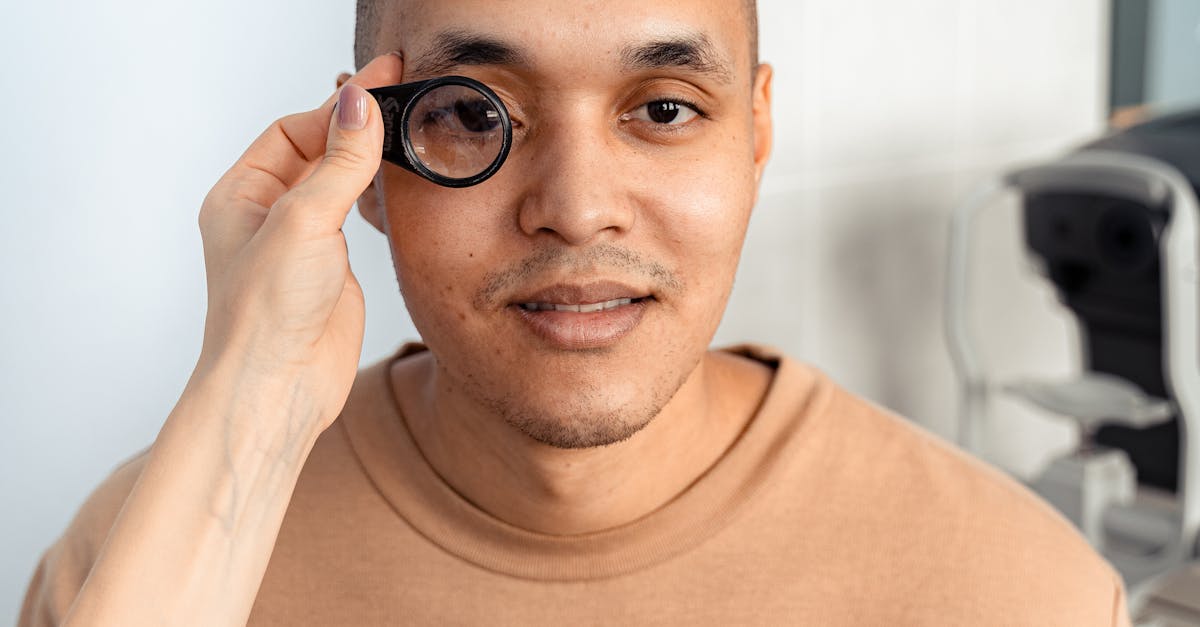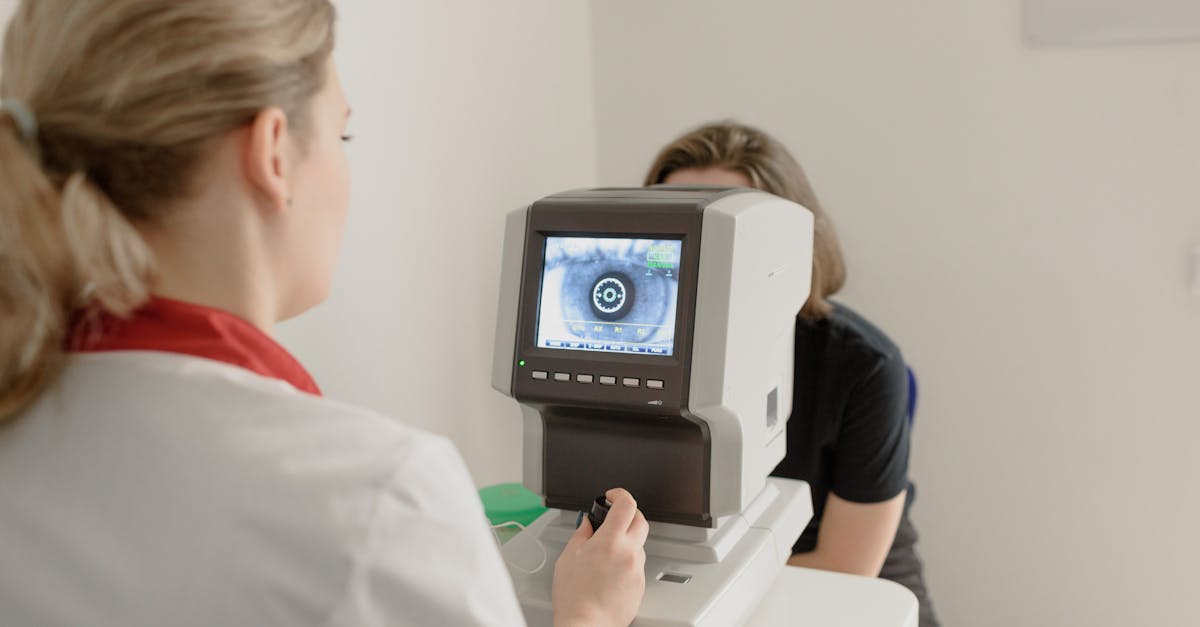When you're trying to figure out who to see for your eyes, the difference between an optometrist and an ophthalmologist really comes down to one simple thing. Think of your optometrist as your primary care provider for vision, the expert you see for eye exams and glasses. On the other hand, an ophthalmologist is a medical and surgical specialist who handles complex eye diseases and performs surgery.
For most of your routine eye care needs in Glendale Heights, from getting a new prescription to managing common conditions, an optometrist at iDoctor is exactly who you need to see.
Choosing Your Eye Care Professional in Glendale Heights
When it comes to your vision, knowing who to call is the first step toward getting the right care. While many people use the term "eye doctor" for both, optometrists and ophthalmologists have very different roles, training, and services. For anyone in Glendale Heights, whether you're over by Camera Park or driving down Bloomingdale Road, understanding this distinction is key to making sure your eyes get the specific attention they deserve.
This quick overview breaks down the core differences in training and focus.
As you can see, the educational path each professional takes shapes their specialty. One centers on primary vision care, while the other is all about advanced medical and surgical treatments.
To make this even clearer, here's a quick reference table.
Optometrist vs Ophthalmologist at a Glance
This table sums up the fundamental roles, services, and training for each professional, helping you quickly see who does what.
| Aspect | Optometrist (O.D.) | Ophthalmologist (M.D.) |
|---|---|---|
| Primary Role | Primary vision care provider | Medical and surgical eye specialist |
| Education | 4-year Doctor of Optometry degree | Medical Doctor (M.D.) degree plus a surgical residency |
| Key Services | Eye exams, glasses, contact lenses, managing common conditions | Eye surgery, advanced disease treatment, eye trauma care |
| When to Visit | Annual check-ups, new prescriptions, dry eye, initial glaucoma management | Cataracts, glaucoma surgery, LASIK, serious eye injuries, referral for complex disease |
This snapshot gives you a solid foundation for understanding the two professions. Now, let's explore their roles in more detail.
Your Primary Vision Partner
An optometrist, who holds a Doctor of Optometry (O.D.) degree, is the professional you'll likely see most often. They are on the front lines, managing your day-to-day visual health. At iDoctor, our optometrists are here to provide detailed eye exams in Glendale Heights, helping patients with things like:
- Annual vision check-ups to monitor your eye health.
- Prescriptions for eyeglasses and contact lenses in Glendale Heights.
- Management of common eye conditions like dry eye or glaucoma.
- Fittings for specialty contact lenses for issues like astigmatism or keratoconus.
Think of your optometrist as the family doctor for your eyes. They are your first call for any non-surgical concerns and play a vital role in managing your vision health over your lifetime.
The Surgical Specialist
An ophthalmologist is a medical doctor (M.D.) who has graduated from medical school and gone on to complete a demanding surgical residency. You would typically see an ophthalmologist after getting a referral from your optometrist for a specific, more advanced issue.
Their work is highly specialized and focuses on:
- Performing delicate eye surgery for conditions like cataracts or for procedures like LASIK.
- Treating serious eye diseases, such as advanced macular degeneration or complex glaucoma.
- Managing eye conditions that are linked to other health problems, like diabetic retinopathy.
Comparing Education and Professional Qualifications
The journey to becoming an eye care professional is demanding, but the educational paths for optometrists and ophthalmologists are quite different. These differences in training are the single biggest reason why their roles in your care are so distinct. It's really what separates routine vision management from complex eye surgery.
An optometrist’s education is highly specialized from day one. After finishing a bachelor's degree, they dive into a demanding four-year Doctor of Optometry (O.D.) program. This curriculum is laser-focused on primary vision care. It equips them to perform comprehensive eye exams, spot a huge range of eye conditions, and prescribe corrective lenses like glasses and contacts.
On the other hand, an ophthalmologist is a medical doctor (M.D.) first. Their path starts with four years of medical school, followed by at least four more years of specialized residency training and surgical fellowships specifically in ophthalmology. Their entire education is grounded in medicine and surgery, preparing them to manage serious diseases and perform delicate eye operations.
The Path of the Optometrist
An optometrist’s training is specifically designed to make them an expert in primary eye health and the visual system. Think of them as your family doctor, but for your eyes.
- Undergraduate Degree: They start with a four-year bachelor's degree, usually with a strong science background.
- Optometry School: Next comes four years of dedicated study to earn their Doctor of Optometry (O.D.) degree.
- Licensing: They must pass national board exams to get licensed to practice in their state.
- Optional Residency: Some optometrists choose to complete an extra year of residency to specialize in areas like pediatric eye care or low-vision rehabilitation.
This focused training makes an optometrist the perfect professional for all your routine and primary eye care needs. If you want some tips on finding a great fit for your family, you can check out our guide on choosing an optometrist for advanced exams.
The Journey of the Ophthalmologist
The road to becoming an ophthalmologist is longer and broader, blending general medical knowledge with highly specialized surgical skills. Their qualifications are a testament to their deep expertise in treating eye diseases with both medicine and surgery.
The core difference is this: an optometrist is a doctor of optometry focused on vision care, while an ophthalmologist is a medical doctor trained in eye surgery. One is your primary vision partner; the other is your surgical specialist.
It's also interesting to note that what an optometrist can do varies quite a bit around the world. Survey data from 2022-2023 across 39 countries reveals major differences in their regulation and education. In some places, optometrists aren't allowed to use certain diagnostic drugs, which can really limit their ability to provide complete primary eye care. You can read the full research about these global optometry standards to see just how much it varies.
A Detailed Look at Their Services
So, what actually happens when you sit in that chair? The services you'll get from an optometrist versus an ophthalmologist are a direct result of their unique training paths. Knowing the difference isn't just trivia; it's what ensures you're booking the right appointment for your needs.
Think of an optometrist as your primary care provider for your eyes. They're your first stop for most vision-related issues that don't involve surgery.
Ophthalmologists, on the other hand, are the surgical specialists. They step in when you need advanced medical treatments or an operation.
What an Optometrist Provides
As your go-to eye care professional, an optometrist at a boutique practice like iDoctor covers a wide spectrum of services to keep your vision sharp and your eyes healthy.
- Routine and Medical Eye Exams: This is the bedrock of good eye care. At iDoctor, our 30-minute detailed eye exams in Glendale Heights use high-resolution imaging to give us an incredibly clear picture of your ocular health.
- Prescription Management: We expertly determine your precise prescription for both eyeglasses and contact lenses in Glendale Heights, making sure you see the world as clearly as possible. This also includes fittings for more specialized lenses.
- Disease Management: An optometrist diagnoses and manages common conditions like dry eye, eye allergies, and infections. They are also absolutely critical for spotting serious diseases early on and co-managing them.
- Pre- and Post-Operative Care: If you do need surgery, your optometrist often coordinates with the ophthalmologist, handling your care before and after the procedure to ensure a smooth recovery.
For most people, a trusted optometrist is the only eye care professional they’ll see regularly. It's an ongoing relationship built on preventive care and managing your vision for the long haul.
What an Ophthalmologist Provides
You’ll typically find yourself in an ophthalmologist’s office after getting a referral from your optometrist. This happens when a specific, complex problem comes up that requires a higher level of medical or surgical care.
A simple trick to remember the difference is that Ophthalmologists perform "Operations." They are the surgeons of the eye world, called in when advanced treatment is necessary.
Their specialized services include:
- Surgical Procedures: They perform surgeries for conditions like cataracts, glaucoma, and retinal detachments. They also handle vision correction procedures, such as LASIK.
- Advanced Disease Treatment: They manage severe and complex eye diseases, including advanced macular degeneration, diabetic retinopathy, and uveitis.
- Serious Eye Trauma: An ophthalmologist treats significant eye injuries that could threaten your vision.
This division of care is more important than ever. In the U.S., there are roughly 48,000 optometrists compared to only about 16,000 ophthalmologists. With an aging population, the demand for medical eye exams is projected to jump by 25% by 2030, which puts optometrists at the forefront of managing a broader range of eye health issues. To see how this affects your care, you can discover more insights about optometry's medical role on aoa.org.
For example, an optometrist is often the very first person to detect signs of glaucoma during a routine exam. You can learn more about what is glaucoma screening in our dedicated article.
When to See Your Local Optometrist
For most of what life throws at your eyes, an optometrist is exactly who you need to see. It’s helpful to think of them as the primary care provider for your vision—your first and most trusted resource for keeping your sight clear and your eyes healthy.
They are the frontline experts for your routine eye care and the first person to call when you notice something isn't quite right. An optometrist handles the vast majority of non-surgical vision needs, making them your go-to for almost everything.
Scenarios for Booking an Optometrist Visit
Knowing when to book an optometrist visit can save you time and make sure you get the right care from the get-go. If any of the following situations sound familiar, your best first step is to schedule an appointment with your optometrist.
- Annual Eye Exams: This is the big one. Regular check-ups are fundamental for monitoring your vision and, just as importantly, catching potential health problems before they escalate. The ideal frequency varies from person to person, and you can learn more about how often to get an eye exam in our detailed guide.
- New Prescriptions for Glasses or Contacts: Is the world looking a little fuzzy? Finding yourself squinting to read road signs? An optometrist will perform a refraction test to pinpoint your exact prescription and get you seeing clearly again with new glasses or contact lenses.
- Managing Common Eye Conditions: Annoying, persistent issues like chronic dry eye, digital eye strain, or seasonal eye allergies are firmly in an optometrist's wheelhouse. They can prescribe medicated eye drops and recommend practical solutions to bring you relief.
- Specialty Contact Lens Fittings: If you need more than a standard lens—like contacts for astigmatism, multifocal lenses for presbyopia, or have a condition like keratoconus—an optometrist has the specialized training to perform a precise, comfortable fitting.
An optometrist is your primary partner in vision care. They not only handle your routine needs but also serve as the gateway to specialized care, ensuring you are referred to an ophthalmologist only when medically necessary.
Your Co-Management Health Partner
An optometrist’s role goes far beyond just writing prescriptions. At iDoctor, our team is a key part of your broader health network. For residents near Glendale Lakes Golf Club or those working along North Avenue, having a local eye expert you trust is a huge advantage.
We’re trained to spot the earliest signs of serious eye diseases like glaucoma and cataracts. We can even detect systemic health issues such as diabetes and high blood pressure, which often reveal their first clues in the eyes. When a condition does require surgery, we work hand-in-hand with a trusted ophthalmologist to co-manage your care.
This means we take care of the pre-operative evaluations and all the post-operative follow-up appointments, creating a seamless and convenient experience for you. This collaborative approach makes the entire process less stressful and ensures that the best optometrist is always at the center of your eye health journey.
When an Ophthalmologist Referral Is Needed
While our optometrists at iDoctor handle a vast range of eye health issues, some situations call for the specialized surgical and medical skills of an ophthalmologist. Knowing when you need this next level of care is crucial, and that's a key part of our job as your primary vision partner.
Our expert optometrists are trained to spot these specific conditions early on. This ensures you get a swift, seamless referral to a trusted specialist, preventing potential vision loss and getting you the right treatment without delay. It's this commitment that allows us to build trust and serve as your complete eye health partner in Glendale Heights.
Conditions Requiring Surgical or Advanced Care
An ophthalmologist referral isn't for everyday issues like getting a new glasses prescription. It's for those times when medicine or surgery is the only path forward.
- Cataract Surgery: When the eye's natural lens gets cloudy and blurs your vision, an ophthalmologist must surgically remove it and implant a clear, artificial one.
- Advanced Glaucoma Management: While optometrists manage early-stage glaucoma, an ophthalmologist takes over if the condition worsens and requires surgery or more complex medical treatments.
- Retinal Conditions: Problems like a detached retina, macular holes, or diabetic retinopathy often demand injections or laser surgery that only a retinal specialist (an ophthalmologist) can perform.
- Severe Eye Trauma: A significant injury to the eye from an accident needs immediate emergency care from an ophthalmologist to have any chance of saving vision and repairing the damage.
The Critical Role of Your Optometrist in Referrals
Your journey to specialized care almost always begins in your optometrist's office. Think of us as the expert gatekeepers for your eye health.
We want to reassure our patients that the team at iDoctor is expertly trained to spot these serious conditions early. We facilitate a smooth referral to a trusted ophthalmologist, making sure your care is coordinated and stress-free.
This process really highlights the complementary relationship between the two professions. There are approximately 331,781 optometrists worldwide, but workforce imbalances mean many regions rely heavily on a much smaller number of ophthalmologists. This underscores just how important it is to have a skilled optometrist who can manage most issues and know exactly when a surgical specialist is needed. You can learn more about these global eye care workforce findings and what they mean for patient care.
Regular check-ups are what make this system work. It’s during these routine visits that we can monitor your eyes and catch problems before they become severe. To understand why these appointments are so vital, you can read our article on the importance of routine eye exams. This proactive approach is the best way to protect your vision for a lifetime.
Your Local Eye Care Expert in Glendale Heights
When you're weighing the difference between an ophthalmologist and an optometrist, think of your optometrist as your primary care doctor, but for your eyes. For those of us in Glendale Heights, Carol Stream, and Bloomingdale, iDoctor is that first stop for keeping your vision sharp for the long haul. We've built our practice to be your go-to resource in a modern, welcoming boutique setting.
We’re known for our 30-minute detailed eye exams and for getting contact lenses in Glendale Heights just right. But it's about more than just a new prescription; it's about building a genuine, long-term focus on your eye health.
Your First Call for Any Vision Concern
At iDoctor, we manage the day-to-day realities of eye care. This means we're constantly helping people with common but frustrating issues like dry eye and eye strain. With so much of our lives spent in front of screens, it's a bigger problem than ever. You might find it helpful to learn more about understanding computer vision syndrome and the practical steps we recommend.
Think of us as your first call for anything eye-related. We're conveniently located for everyone, from families near the Glendale Heights Public Library to professionals working up and down North Avenue.
For routine check-ups, updated prescriptions, and managing common eye conditions, your optometrist should always be your first point of contact. We get to know you and your eyes over the years, acting as your trusted guide for all things vision-related.
And because seeing clearly should also look good, we offer designer eyeglasses in Glendale Heights from a curated collection of luxury brands like Cartier, Gucci, and Tom Ford, along with affordable options like Ray-Ban. You shouldn't have to compromise on style. We also accept all major vision insurance plans to make top-tier eye care accessible.
We invite you to schedule an appointment with the best optometrist in Glendale Heights and see the iDoctor difference for yourself. Our goal is simple: to be the only eye care partner you'll ever need, from your annual exam to finding your next pair of Gucci glasses near me.
Frequently Asked Questions
When it comes to your eyes, it's natural to have questions. Here are a few straightforward answers to the things people often ask us here in Glendale Heights.
Can I buy designer eyeglasses in Glendale Heights without an exam?
Absolutely. While we always believe an up-to-date prescription is the best way to ensure perfect vision, you don't need an appointment to shop with us. Feel free to stop by our Glendale Heights boutique anytime to explore our handpicked collections. Our team can help you find non-prescription sunglasses or select the perfect frames, including luxury brands like Cartier and Prada or iconic styles from Ray-Ban and Kate Spade.
Do I need a referral to see an eye doctor in Glendale Heights?
No, you never need a referral to see an optometrist at iDoctor. We are primary eye care providers, which means we're your first stop for anything related to your vision. You can book directly with us for routine check-ups, getting fitted for contact lenses in Glendale Heights, or if something just doesn't feel right with your eyes. We make it easy to get the care you need, right away.
Do you accept my vision insurance?
We want our services to be accessible to everyone in the Glendale Heights community, so we proudly accept all major vision insurance plans. When you schedule your appointment, our team can check your specific coverage details. We'll handle the paperwork to make sure your visit is seamless and that you get the most out of your benefits, whether for your exam or new eyewear.
How often should I get a comprehensive eye exam?
For most adults, we suggest a comprehensive eye exam every one to two years. It's a great baseline for maintaining healthy vision. However, certain factors might mean we need to see you more often. If you wear contact lenses, have a condition like diabetes, or if eye diseases run in your family, more frequent visits are a smart move. After your first of our detailed eye exams in Glendale Heights, we’ll recommend a personalized schedule that’s right for you.
Ready to experience the difference personalized eye care can make? iDoctor combines advanced clinical expertise with a luxury boutique atmosphere, right here in Glendale Heights. Schedule your appointment today.


